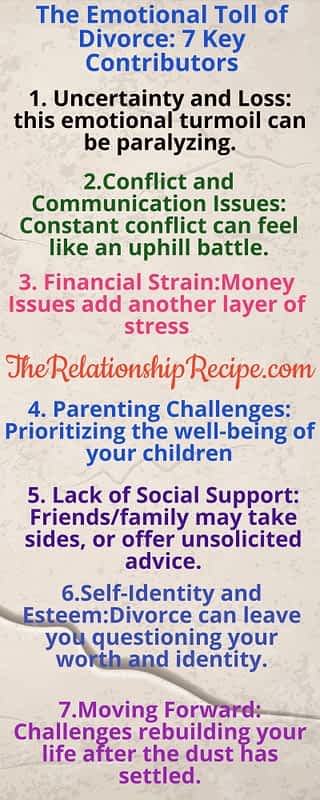Emotional Toll of Divorce: 7 Things That Push Our Absolute Limits
One of the reasons I stayed in my marriage so long, was because I was well aware of the emotional toll of divorce. I’d witnessed how it can destroy people, if they let it. I saw the emotional effects of divorce take good, strong, men and women, and turn them into people they didn’t recognize; people they didn’t want to be.
I wasn’t confident I could weather that storm – especially when emotions during divorce are running high. I knew the only way to get through it is to GO through it. While that may sound obvious, it helped comfort me some as I struggled to make a decision.

💡Key Highlights
- Why the emotional toll of divorce goes beyond just heartbreak
- How financial stress quietly adds to the emotional weight
- The unique challenges parents face managing emotions and co-parenting
- Navigating tricky social dynamics when friends and family take sides
- The steps to reclaim your identity and rebuild after divorce
The emotions during divorce are devastating, and it can steal your soul, your wallet, your health, your emotional well-being (obviously), your mental health, and more.
It doesn’t have to be this way.
🚀The emotional toll of divorce doesn’t have to be an open wound that will never heal. To say it’s difficult to go through, is an understatement for most of us. Many of the people I knew that went through it, came out better and stronger from it, including my own parents.
If you feel like you simply can’t take another day of the emotional effects of divorce anymore, I’m here to say you can, and you will.
You have no other choice.

The emotional effects of divorce are certainly not worth dying, or throwing your sanity, and life, away on. It’s a storm, that will eventually pass. To be honest, I’ve never known anyone who has let their emotions during divorce kill them.
Don’t ever let that be you.
The emotional toll of divorce is often described as one of life’s most stressful events, and for good reason. Beyond the legal and financial entanglements, the emotional effects of divorce can be overwhelming, pushing even the strongest among us to our limits.
In this article, I’ll talk about seven key factors that contribute to the heavy, crazy-making, emotions during a divorce, as well as offer strategies for coping with the emotional toll of divorce.
The Emotional Toll of Divorce: 7 Key Contributors
💔1. Uncertainty and Loss
🚩 The Grief No One Prepares You For
One of the hardest parts of divorce is the quiet, crushing sense of loss that sneaks up on you. You’re not just mourning a relationship – you’re grieving the life you thought you’d have. Whether it was a decades-long marriage or just the dream of what could’ve been, the emotional toll of divorce hits deep.
That foggy mix of heartbreak, fear, and not knowing what comes next? Totally normal. But here’s what’s not helpful: pretending you’re fine. The real healing starts when you stop stuffing it all down and start letting yourself feel it. Facing the emotional effects of divorce head-on, yes, the tears, the rage, the numbness, is how you start to move forward.
Grieving doesn’t mean you’re stuck. It means you’re human. And it’s one of the most important parts of finding peace on the other side.
💔2. Conflict and Communication Issues
💣 When Divorce Turns Into a War Zone
Divorce has a way of dragging out the absolute worst in people, even the ones who swore they’d “keep things civil.” Suddenly, every text feels like a landmine, and basic communication turns into a full-on battle. The emotional toll of divorce hits even harder when you’re stuck in constant conflict.
But here’s the thing: you can take your power back. Learning how to communicate clearly (without getting sucked into the drama) and setting firm boundaries makes a difference. Mediation or therapy can also help, especially when you need a neutral space to work through the chaos without burning every bridge.
Because while the emotions during divorce are real and raw, peace is still possible, even if it’s just peace of mind.

💔3. Financial Strain
💸 Let’s Talk Money Stress – Because Divorce Isn’t Just Emotional
The emotional toll of divorce is already sky-high, and then money swoops in to make everything feel ten times heavier. Suddenly, you’re not just dealing with a broken heart, you’re also trying to figure out who gets what, how to afford life solo, and what the hell your new budget looks like. The emotional effects of divorce hit hard when financial fear creeps in, especially if you’ve been out of the workforce, relied on your partner’s income, or are just used to sharing expenses.
Trying to cope with emotions during divorce is brutal enough, now toss in splitting assets, adjusting to a single-income lifestyle, and possibly downsizing your entire life… it’s a lot, and making a finacial mistake during divorce can devastate your bank account for years. Don’t be afraid to bring in some backup. A financial advisor or a divorce mediator can walk you through the practical stuff, ease the pressure, and give you a clearer path forward.
💔4. Parenting Challenges
👶 Divorcing with Kids? The Emotional Toll Hits Different
If you’re a parent, the emotional toll of divorce hits on a whole other level. You’re not just mourning the relationship – you’re also trying to protect your kids from the emotional fallout. Co-parenting with someone you might barely want to text can feel like an emotional obstacle course.
The emotional effects of divorce show up fast when you’re juggling custody schedules, trying to keep things civil, and wondering how to explain it all to your children without totally falling apart. When it comes to emotions during divorce, it’s a delicate balance of caring for your own heart while also being the steady, safe space your kids need.
What helps is clear communication (even when it’s hard), setting boundaries that protect your peace, and keeping the focus on your kids’ needs instead of the drama. It’s not easy, but it is doable – and your kids will feel the difference.

💔5. Lack of Social Support
💬 Your Circle Might Shrink, and That’s Okay
One of the most overlooked parts of the emotional toll of divorce is the social fallout. Sure, friends and family can be your lifeline, offering comfort, letting you vent at 2 a.m., or just showing up with wine and snacks. But sometimes, those same people can also make things messier. People take sides. They hand out advice you didn’t ask for. Or they go silent because they “don’t want to get involved.”
The emotional effects of divorce aren’t just about your ex – they ripple through your whole social life. Coping with emotions during divorce means learning who’s really in your corner and creating boundaries where you need them. Surround yourself with people who get it, who hold space for you, and who won’t make it about them. And if things start feeling too heavy, a good therapist can be the kind of support you didn’t know you needed until they’re helping you breathe again.

💔6. Self-Identity and Esteem
🪞 When Divorce Messes With Your Sense of Self
One of the sneakiest ways the emotional toll of divorce shows up is when you start questioning who the hell you even are anymore. Especially if you’ve been in the relationship for years, or decades, your identity can feel completely wrapped up in “us.” When that ends, it’s like… what’s left of me?
The emotional effects of divorce often come with waves of self-doubt, shame, or just straight-up confusion. You might wonder if you’re lovable, if you failed, or if you’ll ever feel whole again. Coping with those emotions during divorce means getting real about how broken you might feel, and then slowly, patiently putting yourself back together.
This is your permission slip to focus on you. Self-care isn’t just bubble baths and yoga (though those help) it’s also therapy, setting goals, rediscovering hobbies, and remembering you are still worthy as hell. You’re not starting over… you’re coming home to yourself.
💔7. Moving Forward
🌅 Rebuilding After the Wreckage
Honestly, one of the hardest parts of the emotional toll of divorce might be what comes after the chaos. When the papers are signed, the boxes are unpacked, and the silence sets in… that’s when it really hits. You’re no longer just getting through it. Now you’ve got to figure out how to live again.
Coping with the emotional effects of divorce means learning to let go, not just of the relationship, but of who you thought you were inside it. And that’s no small thing. These emotions during divorce are deep, messy, and often come in waves long after everyone else thinks you’ve “moved on.”
But here’s the truth: you will move forward. Not by rushing. Not by pretending everything’s fine. But by slowly rediscovering what lights you up, what feels meaningful, and who you are now. Joy doesn’t disappear forever, it just waits for you to be ready to find it again.

Strategies for Dealing With Your Emotions During Divorce
🛠️ A Few Ways to Stay Sane Through the Emotional Mess of Divorce
💬 Lean on Your People
The emotional toll of divorce can feel unbearable if you’re trying to handle it alone. Let your friends, family, or even a support group be your emotional landing pad. You need people who remind you you’re not crazy – and you’re definitely not broken.
🧘 Put Yourself Back on the List
Between court dates and emotional whiplash, self-care can feel like a luxury. It’s not. It’s survival. Movement, meditation, walks, trashy reality TV – whatever soothes your nervous system, do more of that. These are small steps toward healing the deeper emotional effects of divorce.
🚧 Protect Your Peace With Boundaries
Trying to be “nice” to keep the peace with your ex can backfire fast. Boundaries aren’t cold; they’re necessary. Limiting communication, setting clear expectations, and not jumping to fix their mess helps keep your emotions during divorce from spiraling out.
📂 Get Your Ducks (and Docs) in a Row
The legal and financial chaos can be overwhelming, but a little structure goes a long way. Lists, folders, spreadsheets… whatever helps you stay on top of things will also help reduce anxiety. And bonus: being organized gives you back a sense of control when everything feels upside-down.

🧠 Talk It Out With a Pro
Therapy isn’t just for when you’re falling apart, it’s how you start putting yourself back together. Processing the deep emotional effects of divorce with someone trained to help can give you tools to cope, grieve, and start healing in a healthy way.
👨👩👧 Keep the Kids at the Center
If you’re a parent, you already know this: your kids are watching everything. Prioritizing their well-being doesn’t mean pretending you’re fine. it’s honest, age-appropriate communication and showing up for them even while your own heart’s hurting.
🌱 Try to Find the Light
This season is rough, no doubt. But even in the rubble, there’s space for growth. Reframing the emotional toll of divorce as the beginning of something new can be powerful. Small wins, new interests, new routines – these are the seeds of your future self.
⏳ Give Yourself Grace
Healing from a divorce isn’t a linear process. You’ll have days where you feel strong and others where it all tumbles down again. Be patient. Be gentle. You’re doing something incredibly hard, and you’re still standing.
🚫 Protect Your Energy
Whether it’s muting toxic people, avoiding gossip, or logging off social media, limit what drains you. The emotions during divorce are already heavy and you don’t need anyone else’s baggage on top of your own.
🔭 Look Forward, Even if it’s Foggy
It may feel impossible to picture a future that isn’t tied to your past, but one day it won’t be. Set small goals. Dream a little. Visualize a life that feels good in your body and soul. There is something beautiful waiting on the other side.

Final Thoughts on the Emotional Affects of Divorce
💬 You’ve Got This (Even If It Doesn’t Feel Like It Yet)
Dealing with emotions during divorce is brutal. It cracks you open in ways you never saw coming. But as gut-wrenching as it is, this chapter isn’t just about loss. It’s also about rediscovery.
Facing the emotional toll of divorce head-on, messy feelings and all, is how you start to build something new. Something stronger. You’re not broken; you’re becoming. And no, you don’t have to figure it out alone. There’s help, there’s healing, and there’s a whole future waiting for you on the other side.

Thank you for reading this post, don't forget to subscribe!







